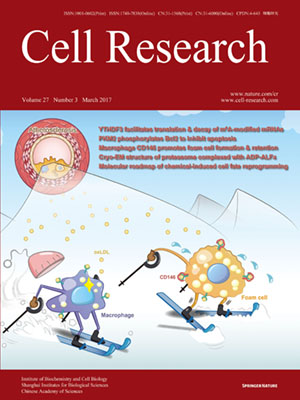
Volume 27, No 3, Mar 2017
ISSN: 1001-0602
EISSN: 1748-7838 2018
impact factor 17.848*
(Clarivate Analytics, 2019)
Volume 27 Issue 3, March 2017: 329-351 | Open Access
ORIGINAL ARTICLES
Mitochondrial PKM2 regulates oxidative stress-induced apoptosis by stabilizing Bcl2
Ji Liang1,2,3,*, Ruixiu Cao1,2,3,*, Xiongjun Wang1,2,3, Yajuan Zhang1,2,3, Pan Wang1,2,3, Hong Gao1,2,3, Chen Li1, Fan Yang4, Rong Zeng1, Ping Wei5, Dawei Li6, Wenfeng Li7 and Weiwei Yang1,2,3
1CAS Key Laboratory of Systems Biology, CAS Center for Excellence in Molecular Cell Science, Institute of Biochemistry and Cell Biology, Shanghai Institutes for Biological Sciences, Chinese Academy of Sciences, Shanghai 200031, China
2Shanghai Key Laboratory of Molecular Andrology, Institute of Biochemistry and Cell Biology, Shanghai Institutes for Biological Sciences, Chinese Academy of Science, Shanghai 200031, China
3Innovation Center for Cell Signaling Network, Institute of Biochemistry and Cell Biology, Shanghai Institutes for Biological Sciences, Chinese Academy of Science, Shanghai 200031, China
4Shenzhen Center for Disease Control and Prevention, Shenzhen, Guangdong 518055, China
5Department of Pathology, Fudan University Shanghai Cancer Center, Shanghai 200032, China
6Department of Colorectal Surgery, Fudan University Shanghai Cancer Center, Shanghai 200032, China
7Department of Radiation Oncology, First Affiliated Hospital of Wenzhou Medical College, Wenzhou, Zhejiang 325000, China
Correspondence: Weiwei Yang,(weiweiyang@sibcb.ac.cn)
Pyruvate kinase M2 isoform (PKM2) catalyzes the last step of glycolysis and plays an important role in tumor cell proliferation. Recent studies have reported that PKM2 also regulates apoptosis. However, the mechanisms underlying such a role of PKM2 remain elusive. Here we show that PKM2 translocates to mitochondria under oxidative stress. In the mitochondria, PKM2 interacts with and phosphorylates Bcl2 at threonine (T) 69. This phosphorylation prevents the binding of Cul3-based E3 ligase to Bcl2 and subsequent degradation of Bcl2. A chaperone protein, HSP90α1, is required for this function of PKM2. HSP90α1's ATPase activity launches a conformational change of PKM2 and facilitates interaction between PKM2 and Bcl2. Replacement of wild-type Bcl2 with phosphorylation-deficient Bcl2 T69A mutant sensitizes glioma cells to oxidative stress-induced apoptosis and impairs brain tumor formation in an orthotopic xenograft model. Notably, a peptide that is composed of the amino acid residues from 389 to 405 of PKM2, through which PKM2 binds to Bcl2, disrupts PKM2-Bcl2 interaction, promotes Bcl2 degradation and impairs brain tumor growth. In addition, levels of Bcl2 T69 phosphorylation, conformation-altered PKM2 and Bcl2 protein correlate with one another in specimens of human glioblastoma patients. Moreover, levels of Bcl2 T69 phosphorylation and conformation-altered PKM2 correlate with both grades and prognosis of glioma malignancy. Our findings uncover a novel mechanism through which mitochondrial PKM2 phosphorylates Bcl2 and inhibits apoptosis directly, highlight the essential role of PKM2 in ROS adaptation of cancer cells, and implicate HSP90-PKM2-Bcl2 axis as a potential target for therapeutic intervention in glioblastoma.
10.1038/cr.2016.159
FULL TEXT | PDF
Browse 2042


